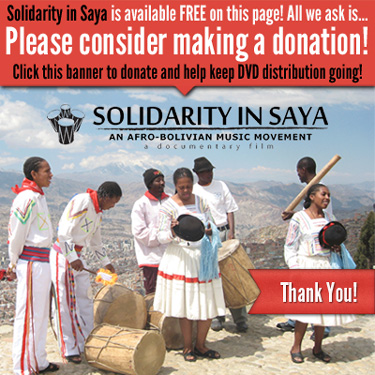Solidarity in Saya Blog
Interview with Enzo Pinedo
Enzo Pinedo was an active youth member of MOCUSABOL in La Paz when “Solidarity in Saya” was filmed.
I interviewed Enzo in the spring of 2012 to see what he has been up to.
Maya: Do you still live in La Paz?
Enzo: In this moment, no.
M: Where do you live?
E: Right now in Chile
M: Where in Chile?
E: In Santiago, the capital of the country.
M: Why did you move to Santiago?
E: Because I have to practice in my career and I realized that in Chile I can practice and I can make more money than in my country.
M: Which career?
E: Auto mechanics
M: How is Santiago? And what is your experience as an Afro-Bolivian living there?
E: You tend to draw more attention.
M: Do you know other black people in Chile? Afro-chilenos or people from other countries?
E: Yes where I work, there is a man from the Congo and many from Haiti, Colombia, Ecuador, and Peru.
M: In the past years since I filmed the documentary, before you left Bolivia, were you still involved with MOCUSABOL?
E: Yes for about 2 years more.
M: How is everything going with the organization?
E: It is more organized from what they have told me and because you hear in the news that we have a representative deputy [in parliament].
M: You’re speaking about Jorge Medina?
E: Yes I spoke with him. He has connections with everyone.
M: Were the Saya organizations very involved in the campaign for his election?
E: Yes but it was also that this was the only opportunity to have a representative in power.
M: Can you explain a little more what you mean by that?
E: Well there were many candidates but very few had the popularity that Jorge had. For him the only thing left was to organize the people on the day of the elections.
M: In your experience, how do you think the conditions for Afro-Bolivians have changed over these last 6 years?
E: We have gained much. We are past being just a group of immigrant afros mixed with the indigenous people to being a group with and impact with political representation.
M: How do you think the changes in the constitution and having a representative has affected the lives of Afro-Bolivians.
E: Look, these were things that before this, one didn’t think about because they were things only for people very involved in politics. Many therefore only thought that you had to accept your condition with little possibilities for changing things. The changes in the government really helped because it has been showing a different form of politics.
M: What do you mean by a different form of politics?
E: Different because now they speak about Afro-Bolivians and their needs and we have representation. Different because the people from each ethnic group have become equal citizens.



